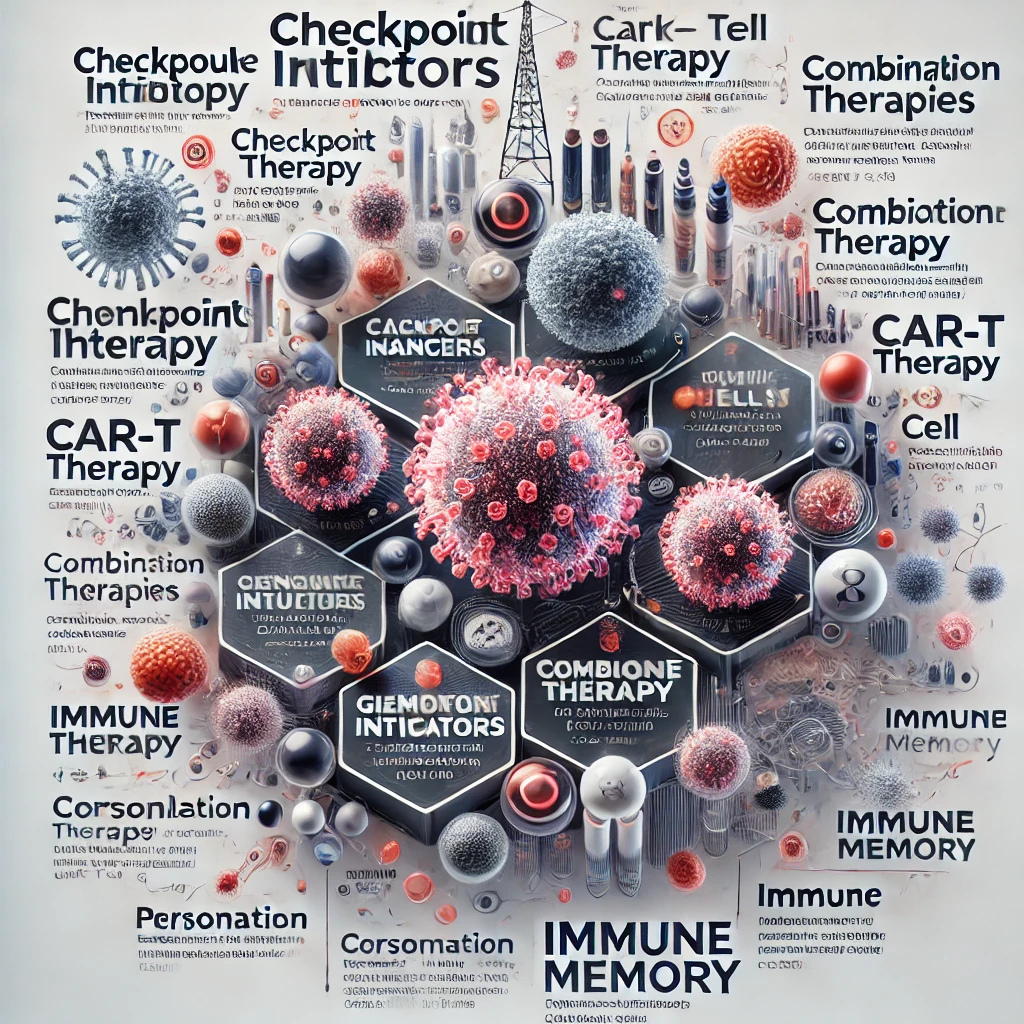Evaluating the Efficacy of Immunotherapy in Cancer Treatment
1. Introduction
Cancer remains one of the leading causes of death worldwide, affecting millions of people each year and placing a significant burden on healthcare systems globally (Turkewitz et al., 2024). Traditional treatments, such as surgery, chemotherapy, and radiation, have made strides in managing certain cancers; however, their limitations and side effects have spurred interest in alternative therapies. Immunotherapy has emerged as a promising treatment modality that leverages the body’s immune system to detect and combat cancer cells more effectively. This review examines recent advances in immunotherapy, focusing on its efficacy across various cancer types, its potential benefits, and challenges that remain in broadening its application.
2. Critical Review
2.1 Types of Immunotherapies
One of the primary approaches in immunotherapy is the use of checkpoint inhibitors, which target immune checkpoints—proteins that usually prevent the immune system from attacking normal cells. Cancer cells exploit these checkpoints to evade detection; drugs like PD-1 (Programmed Death-1) inhibitors and CTLA-4 (Cytotoxic T-Lymphocyte-Associated Protein 4) inhibitors work by blocking these proteins, allowing T-cells to better identify and destroy cancer cells (Lu et al., 2020). Checkpoint inhibitors have shown remarkable results in cancers such as melanoma and non-small cell lung cancer.
CAR-T cell therapy is another innovative type of immunotherapy in which a patient’s T-cells are extracted, genetically modified to better recognize cancer cells, and reinfused into the patient’s body (Sterner & Sterner et al., 2021). This approach has demonstrated significant success in treating blood cancers like leukemia and lymphoma, providing a highly personalized treatment option.
Cancer vaccines represent a preventive and therapeutic approach, aiming to enhance immune responses against specific cancer markers. Recent developments in cancer vaccines show promise in reducing recurrence, particularly in cancers like prostate cancer.
Immune modulators work to generally boost the immune response against cancer cells. These drugs, including interferons and interleukins, enhance immune activity, making the environment less conducive for cancer growth.
3. Recent Advances and Efficacy
In recent years, immunotherapy has made substantial strides in cancer treatment, with numerous studies and clinical trials reporting promising efficacy rates. For example, checkpoint inhibitors have shown impressive results in extending survival rates for patients with advanced melanoma, where traditional treatments often fall short. In lung cancer, particularly non-small cell lung cancer, the use of drugs like pembrolizumab and nivolumab has significantly improved patient outcomes, making immunotherapy a viable option in settings where limited treatment choices previously existed.
The advantages of immunotherapy extend beyond efficacy. Unlike traditional treatments, which often cause damage to healthy cells, immunotherapy is more targeted, reducing the risk of severe side effects. Immunotherapy treatments have the potential for long-lasting effects due to the immune system’s ability to remember cancer cells, potentially offering sustained remission even after treatment ends (Demaria et al., 2021). Personalization is another benefit; treatments can be tailored to individual patients based on their unique immune system characteristics, improving effectiveness and patient outcomes.
Despite these advantages, immunotherapy is not without limitations. Immune-related side effects can occur, as the treatment can sometimes trigger an overactive immune response, resulting in inflammation and autoimmunity in organs like the liver, lungs, and colon. Another challenge is treatment resistance; some patients may not respond to immunotherapy, while others may develop resistance over time. High costs associated with immunotherapy can limit accessibility, as treatments like CAR-T cell therapy can be prohibitively expensive.
Combination therapies, where immunotherapy is used alongside chemotherapy, radiation, or targeted drugs, are currently being explored to enhance treatment efficacy. These combinations aim to increase the likelihood of tumor response by targeting cancer through multiple pathways, providing hope for improved outcomes in difficult-to-treat cancers. In the future, with advancements in technology and a better understanding of the immune system’s intricacies, immunotherapy is poised to become a cornerstone of cancer treatment, potentially transforming oncology practices and bringing hope to millions affected by cancer (Waterhouse et al., 2020).

4. Conclusion
Immunotherapy has shown tremendous promise in revolutionizing cancer treatment, offering increased survival rates and durable responses for many patients. While its benefits make it a powerful alternative to traditional methods, challenges related to cost, side effects, and resistance remain. Further research is essential to overcome these obstacles and make immunotherapy more widely accessible and effective.
References
-
Turkewitz, A. R., Sallen, J. P., Smith, R. M., Pitchford, K., Lay, K., & Smalley, S. (2024).
The benefits and limitations of establishing the PA profession globally: A systematic review
and mixed-methods study.
JAAPA, 37(11), 1-51. DOI:
10.1097/01.JAA.0000000000000146
(healthcare systems globally)
-
Sterner, R. C., & Sterner, R. M. (2021). CAR-T cell therapy: current limitations and potential strategies.
Blood cancer journal, 11(4), 69. DOI:
10.1038/s41408-021-00459-7
(CAR-T cell therapy)
-
Lu, Y., Chen, L., Li, L., & Cao, Y. (2020). Exosomes derived from brain metastatic breast cancer cells
destroy the blood‐brain barrier by carrying lncRNA GS1‐600G8.
BioMed research international, 2020(1), 7461727. DOI:
10.1155/2020/7461727
(destroy cancer cells)
-
Demaria, O., Gauthier, L., Debroas, G., & Vivier, E. (2021). Natural killer cell engagers in cancer immunotherapy:
next generation of immuno‐oncology treatments.
European Journal of Immunology, 51(8), 1934-1942. DOI:
10.1002/eji.202048953
(Immunotherapy treatments)
-
Waterhouse, D. M., Harvey, R. D., Hurley, P., Levit, L. A., Kim, E. S., Klepin, H. D., ... & Schilsky, R. L. (2020).
Early impact of COVID-19 on the conduct of oncology clinical trials and long-term opportunities for transformation:
findings from an American Society of Clinical Oncology Survey.
JCO Oncology Practice, 16(7), 417-421. DOI:
10.1200/OP.20.00275
(transforming oncology practices)